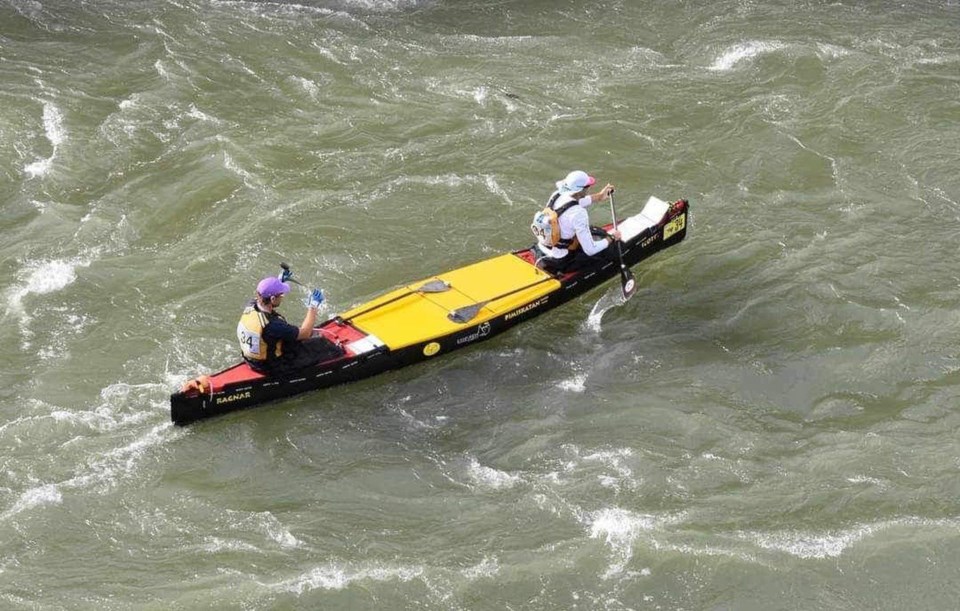LA RONGE — For most, it may well be that learning there’s a canoe race in Canada that entails paddling 715 kilometres for upwards of 55 hours is so unfathomable they may need to do several proverbial laps around their minds to grasp the enormity of the Yukon River Quest. So we asked a La Ronge, Sask., team to tell us more about racing for the long game.
Now in its 23rd year, this year’s instalment of the Yukon River Quest gathered 54 teams from 10 countries — including seven Canadian provinces and territories — for an epic canoe race through the Yukon from Whitehorse to Dawson City. It is believed to be the longest canoe race in Canada, .
“We just get a lot of satisfaction from challenging ourselves,” said Ragnar Robinson, after he and teammate Scott Fraser finished in fourth place.
Unlike what might be expected from the quintessentially Canadian recreational activity, there’s nothing amateur about paddling for 715 kilometres at a time. The only thing the racers have is their teammates and a rationed amount of water, food and essential items as sustenance between checkpoints. The overall race results reveal tightly packed brackets full of numbers, dates, and names.
Robinson and Fraser, long-time friends who have been training to compete in increasingly longer-distance sports, are surprisingly calm in tone. It’s perhaps not the immediate impression one might have of ultra-athletes, but it is indicative of the mindset required for racing for hours on end.
The farthest length in the in the Olympic Games has been 10,000 meters. This ultra-canoe race is 71.5 times longer.
Fraser and Robinson’s circle of long-distance cross-country skiing friends inspired the duo to take on ultra-canoeing.
“It’s a slow increase in challenging yourself and eventually doing ultra events because you’re training to that level,” Robinson said.
The event started in Whitehorse, where the excitement of an ordinary race persisted before regulating itself. More than halfway through, there was a rest stop in Carmacks where competitors had 10 hours to eat, sleep, and complete a safety check before heading out again. For Fraser and Robinson, after the break in Carmacks, the duo reached a mental and physical hurdle — fighting exhaustion. It wasn’t for a lack of preparation.
In addition to regularly cross-country skiing between 55 and 60 kilometres, Robinson and Fraser trained robustly for the canoe race. They completed a three-day, 160-kilometre canoe trip in La Ronge, singing the praises of the La Ronge Pimiskatan Canoe Club that has made the sport so accessible.
“Both of us have the mindset that we finish everything we start and everything we sign up for,” Fraser said.
“I think that really helps push through. I’m not going to quit because we know how it feels when we cross that finish line because crossing that finish line has a lot of rewards.
“Between Whitehorse and Dawson City, where the race concludes, organizers estimate racers repeat the same paddle motion more than 300,000 times. They usually have to stay in one position for upwards of 30 hours. Along the route, they have to watch for two rapids: the Five Finger Rapids and Rink Rapids. Once they reach Lake Laberge, they could face a “mirror-flat mill pond” or “an angry sea” with winds and waves that can knock paddlers overboard if they don’t follow instructions. include the potential of catching hypothermia. Consider it both a cognitive and physical exercise — a test to overcome.
“In the moment of the race, it’s not fun and you wonder why we’re doing this but after the fact you find it was fun,” Fraser said.
Added Robinson: “When you have normal problems, in your normal life, they don’t seem as bad. You can push yourself past the mental step.”
On July 6, Robinson and Fraser reached Dawson City, completing the race in 48 hours, 15 minutes. The winning team — Jen and Seb Courville from Golden Lake, Ont. — finished in 46 hours, 17 minutes. The winning pair use canoe manufacturer Kisseynew Canoe Company, from the Saskatchewan community of Air Ronge.
The Saskatchewan duo has been Inspired by friends, supported by family, and propelled forward by the ambition to do better, to be greater, to keep evolving and become the best versions of themselves in their quest. Surrounded by the soothing Canadian wilderness — majestic in presence, serene with what is.
“The people we’ve grown up cross-country skiing with, they’ve shown us this event and how it’s something we can try,” Fraser said.
“All the motivation to do it is self-motivated.”


